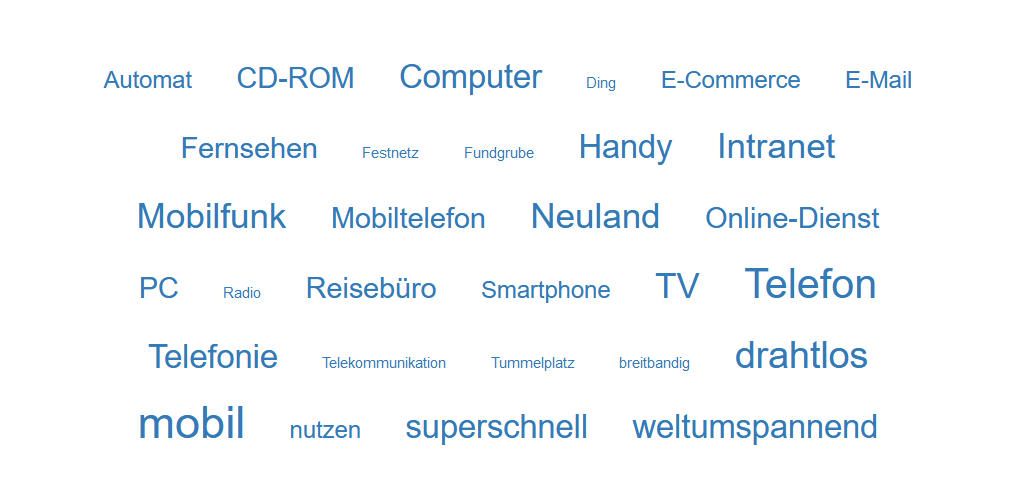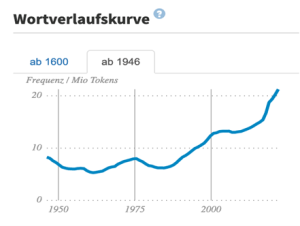Vocabulary Module 12: Internet
In this module, you will learn some vocabulary to talk about the internet (das Internet) using Das Digitale Wörterbuch der Deutschen Sprache (DWDS), a large electronic collection of German texts known as a corpus. Let’s explore what words German speakers use to talk about the internet. Go to the DWDS homepage and type Internet in the search box. You will be taken to a page that gives you a lot of information about this word, but we will focus on the so-called ‘word cloud’ which is available in the Typische Verbindungen section.

This word cloud shows the words that commonly occur with the word Internet; such words are known as collocates. The larger the word in the image is, the more often it co-occurs with Internet. You can also see a numerical representation of the frequency of co-occurrence by looking at the Überblick table for Internet accessible through the Detailliertere Informationen link above the word cloud.
Activity 1
A.
First, let’s review which other technologies are frequently used with Internet. Click the Detailliertere Informationen link above the word cloud for Internet and scroll down to the table hat in Koordination mit. Match the technologies in the list below with their English equivalents. If needed, you can consult the online dictionary LEO.
Click on the words in the table to see their usage examples with Internet. E.g.: Internet und TV wachsen also immer mehr zusammen.
B.
1.
You can see many German-English cognates in this list – i.e., words that look similar and mean the same in both languages. However, there are some differences: e.g., all German nouns are capitalized and Telefon is spelled with an “f”.
Consider the DWDS examples below and decide what the word Handy means.
- In meinen ersten Arbeitsjahren hatten wir kein Internet, keine E-Mail und kein Handy.
«Ich kann Mangel an Loyalität nicht ausstehen». Neue Zürcher Zeitung, 21.03.2020 - Außerdem bekommt man alle Informationen über das Internet und über das Handy.
Selbst gebackener Rosinenkuchen für die Helfer. Neue Osnabrücker Zeitung, 10.07.2017 - Ich benutze kein Smartphone, habe also kein Internet auf dem Handy.
„Europas Firmen werden ausspioniert“. Süddeutsche Zeitung, 23.01.2014
2.
Next, read the sentences below, which contain examples with Handy taken from the DWDS corpus. Can you figure out the difference between the sentences with klingeln (1, 2, 3) and klingelnd (4, 5)?
- Am nächsten Tag klingelt mein Handy, auf dem Display blinkt eine französische Nummer.
Die Zeit, 28.01.2013, Nr. 04 - Wenn ihr Handy klingelt, wird sie nervös und zittert leicht.
Die Zeit, 16.04.2007, Nr. 16 - Sein Handy klingelt oft in Meetings – obwohl er das selbst verboten hat.
Bild, 02.02.2006 - Pöppel: Auf das klingelnde Handy, auf Gespräche, auf alles, was um uns herum passiert.
Die Zeit, 15.02.2010, Nr. 07 - Das grüne Lämpchen ist wie ein dauernd klingelndes Handy, auf dessen Display der Name des Ex erscheint – und nie hebt man ab.
Die Zeit, 31.08.2009, Nr. 35
C.
Now let’s find out more about the use of the noun Computer, a collocate of Internet. Search for Computer from the main DWDS page and go to the Detailliertere Informationen link above its word cloud. Then, scroll down to the ist Genitivattribut von table. You can see a list of nouns associated with computers. Decide which of them refer to computer attributes and which to the importance of computers in the modern world. If needed, you can consult the online dictionary LEO.
Click on the words in the table to see their usage examples with Computer. E.g.: Wenn Journalisten schreiben, hört man das leise Trommeln auf der Tastatur eines Computers. Und deshalb leben wir nicht nur im Zeitalter des Computers, sondern auch im Zeitalter des Programmierers.
D.
Now, let’s explore how some collocates of Internet and Computer are used in context. Complete the DWDS examples below based on their English translations with one of the given phrases.
E.
It is important to learn the German nouns together with their articles. Look at 14 nouns that you learned in this module in the list below and identify 4 nouns that go with der, 4 nouns that go with die, and 6 nouns that go with das. Note that E-Mail can be used with both die and das!
Activity 2
A.
Now let’s explore some verbs that are frequently used with the nouns Internet and Computer. Read the DWDS examples below, pay attention to the bolded phrases.
- Jetzt hat er ihre geheime Adresse ins Internet gestellt.
Nicht mit mir. Süddeutsche Zeitung, 23.03.2021 - Denn mit 4G und 5G kann man unterwegs viel schneller im Internet surfen.
3G. Süddeutsche Zeitung, 03.07.2021 - Und dann gibt es Waren wie Gartenmöbel, die vor der Pandemie fast nie im Internet bestellt wurden.
Wie schön ist das denn. Süddeutsche Zeitung, 24.08.2021 - Man könne sich alles, was wir wissen müssen, aus dem Internet herunterladen.
Bünger Reinhart: “Wir müssen wieder städtische Räume schaffen”.
Der Tagesspiegel, 14.12.2019 - Ich mache meine Hausaufgaben und sie arbeitet am Computer.
Und was treibt ihr so?Der Tagesspiegel, 28.03.2020 - Mehr als 40 Prozent der europäischen Erwerbstätigen sitzen am Computer.
Was muss ein guter Bürostuhl können?Neue Osnabrücker Zeitung, 23.10.2020 - Nein, Kinder, die erste Kamera, deren Bilder man auf dem Computer speichern konnte, kam 1991 auf den Markt.
Impressionen. Frankfurter Rundschau, 06.08.2018 - Auf einer Webseite konnte man sich kurzzeitig die Schriften toter Rockstars als Fonts auf den Computer laden.
Die Welt, 16.04.2018
You probably noticed that the bolded phrases in the examples above contain prepositions. It is important to learn what prepositions and articles go with what nouns and verbs, as this matching may be different in German and English. Look at the German prepositions and articles below and choose the correct translated phrases.
B.
In the examples below taken from DWDS, you will see 5 different verbs which are used for shopping and booking online.
- Viele Kunden würden etwas im Laden sehen, es dann aber online bestellen.
Die Zeit, 18.05.2011 (online) - Die Skipässe kann man ab sofort online ordern und vermeidet somit Wartezeiten an der Kasse.
Die Welt, 03.01.2003 - Danach shoppen 96 Prozent der regelmäßigen Internetsurfer auch online.
Die Zeit, 17.09.2012 (online) - Auch die drei Ferienwohnungen des Dorfes kann man online buchen.
Die Zeit, 17.11.2008, Nr. 46 - Mehr als jeder zweite Tablet-Nutzer (56 Prozent) spielt auf seinem Gerät, 53 Prozent kaufen damit online ein.
Die Zeit, 07.10.2013 (online)
Search for each of the 5 verbs (bestellen, ordern, shoppen, buchen, and einkaufen) in turn and click on their Wortverlaufskurve. You can find that on the right side of the website. It will show how the frequency of these words as used in newspapers changed over time.

Choose the correct answer.
C.
Let’s explore what products and services are frequently booked online. Search for buchen from the main DWDS page and scroll down to its word cloud. You probably noticed many nouns.
1.
Match the nouns listed below with their English equivalents. If needed, you can consult the online dictionary LEO.
2.
Now, match these nouns with correct articles: 4 nouns go with der, 3 with die, and 2 with das.
To see sentence usage examples of these nouns with buchen, click the Detailliertere Informationen link above its word cloud and click on the nouns in the Überblick table. E.g.: Wir haben schon unsere Tickets in den Süden für den Sommer gebucht!
Activity 3
A.
One of the collocates of Internet is Informationsquelle (“information source”). Let’s explore the usage of Information. Search for Information from the main DWDS page and go to the Detailliertere Informationen link above its word cloud. Then, look at its verb collocates in the table ist Akk./Dativ-Objekt von. Match the verbs listed below with their English equivalents. If needed, you can consult the online dictionary LEO.
Click on the words in the table to see their usage examples with Information. E.g.: Allerdings fanden die Demonstrant:innen immer wieder Wege, Informationen zu verbreiten.
B.
Now, look at the adjective collocates of Information in the table hat Adjektivattribut. Match the adjectives listed below with their English equivalents. If needed, you can consult the online dictionary LEO.
Click on the words in the table to see their usage examples with Information. E.g.: Es ist schlecht, wenn falsche Informationen die Menschen von der Impfung abhalten.
C.
Consider the DWDS examples below and answer the questions.
- So kann sie dort sensible Informationen abfischen oder über den Account Falschinformationen verbreiten.
Moskau soll Attacken stoppen. Süddeutsche Zeitung, 07.09.2021 - Gesundheitsdaten sind sensible Informationen.
Sind Sie geimpft? Süddeutsche Zeitung, 02.09.2021 - Nicht nur für Kriminelle sind Krypto-Handys interessant, sondern überall dort, wo besonders sensible Informationen ausgetauscht werden.
Gian Andrea Marti, Michele Coviello: Drogenring tappt in die Krypto-Falle des FBI. Neue Zürcher Zeitung, 10.06.2021 - Da lagern jetzt also allerlei sensible Informationen: Klassenarbeiten, Notenlisten, Zeugnisse.
Ganz alte Schule. Süddeutsche Zeitung, 08.05.2021
Activity 4
One of the collocates of Information is Zeitung (“newspaper”). Let’s explore the usage of Zeitung. Search for Zeitung from the main DWDS page and go to the Detailliertere Informationen link above its word cloud. Then, look at its verb collocates in the table ist Subjekt von. Match the verbs listed below with their English equivalents. If needed, you can consult the online dictionary LEO.
Click on the words in the table to see their usage examples with Zeitung. E.g.: Die Zeitung, an die ich einen Leserbrief schicke, muss ihn veröffentlichen.
Activity 5
Review the verbs that go with the nouns Internet, Information, and Zeitung and choose the correct verb for the sentences below.
Activity 6
On your own. Using the word clouds from this module, write 5-6 sentences about Internet. Pay careful attention to which nouns, adjectives, and verbs frequently go together! Use appropriate adjective endings and correct verb forms.
For example:
Ich surfe oft im Internet.
Jeden Tag lese ich wichtige Informationen in der Tageszeitung.
Mein Handy klingelt sehr laut und stört andere Personen.
Schirin Kourehpaz & Nina Vyatkina

